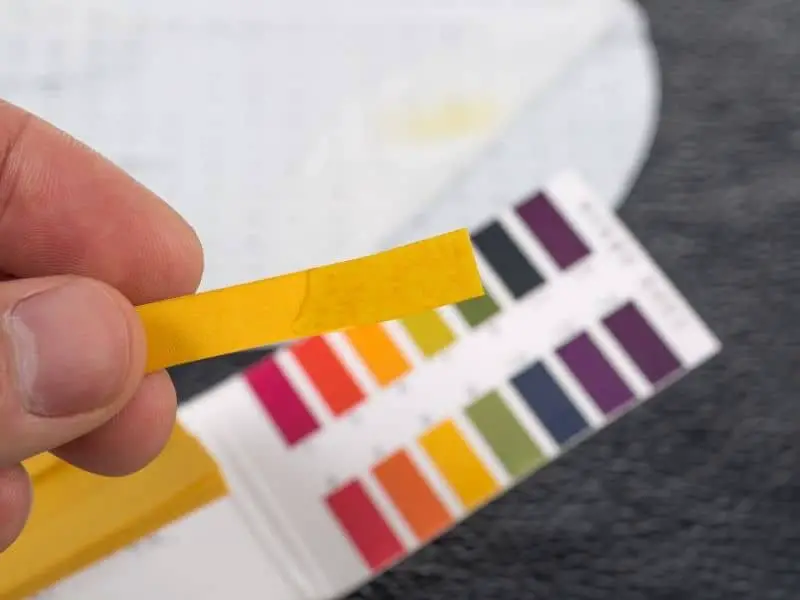Before we look at coffee, we need to understand what we are talking about. In general, the type of acid in foods is not the full-strength hydrochloric acid type that burns holes in your school desk in chemistry class.
Most foods contain acids of some kind. Citric acid is in fruits like oranges, lemons, and grapefruit. Tartaric acid in potatoes, oxalic acid in bananas, and phosphoric acid in beer and cocoa.
So, is coffee acidic?
Coffee beans are complex little packages that contain all of the above and, in fact, have around thirty different organic acids. These are released in the roasting and brewing processes, giving us the unique aromas and flavors we know and love.
How acidic is coffee?
Eminent scientists have said that a cup of coffee is about as acidic as a banana. Okay, so they didn’t exactly say it like that, but that was their general conclusion.
This can surprise many who drink their coffee black because the slightly bitter tang of the acetic acid is the first sensation they get on their palates, but it’s true.
On the pH scale, which measures acidity, coffee (pH 4.85 -5.1) comes in below drinks like beer (pH 4-5) and orange juice (pH 3.3 – 4.15), so it’s not that bad.
P.s. a lower pH number means it is more acidic.

Does coffee make your stomach acidic?
Although coffee contains many different acids, it is actually the caffeine that causes the stomach to react and produce more gastric acid. The odd thing about this is that caffeine is an alkaloid, the direct opposite of an acid.
Reasons for this are still largely unknown, but researchers believe that when the bitterness of coffee hits the taste buds, the stomach starts to prepare itself for something pretty strong coming down. The miracle of the human body, indeed.
The fact remains that many people have negative stomach reactions to the acidity level in coffee and have to reduce their coffee consumption accordingly.
Is decaf coffee acidic?
Usually, the first thing a doctor will tell you when you go to see about your high blood pressure is to stay away from caffeinated drinks.
Faced with the option of switching to decaf, the patient often has a pleasant surprise – it doesn’t taste much different. This is because it is not the caffeine that gives coffee its flavor and aroma; it is the acids still present in decaf after the caffeine has been washed away.
Of course, caffeine packs a punch, keeps you awake, wakes you up in the morning, and keeps you on the road on a long road trip. Without that, coffee is just a great-tasting drink with the impact of a banana (why are we always talking about bananas?).
Although acids are still present in decaf, they are at slightly lower levels, and overall it will cause less gastric acid to be produced in the stomach.
How to reduce acidity in coffee
Coffee beans that are roasted slowly, especially to a dark roast, produce less acid.
However, if all you have in the pantry is a medium or light roast, or maybe you prefer the flavor of those roasts, there are several things you can do to reduce the acidity of coffee made at home.
The first option is to add a little milk. The calcium in milk is an alkali, which neutralizes acid, and takes away most of the sharpness, giving a smooth rounded taste.
Some people believe that adding sugar will do it – acid is bitter, sugar is sweet, so it should work, right? Well, it does a little, but you need to add a lot of sugar to make a difference.
Sugar will reduce the effect of caffeine but doesn’t do much for the acids.
Adding a little baking soda or even salt is more effective – although if you have ever put salt in your coffee by mistake, you might think the cure is worse than the problem.
5 Low-acidity coffee options
There are several ways to reduce coffee acidity. First, look at the type of roast you are buying.
The roasting process determines the flavor, strength, and acidity. Darker roasts have less acid; lighter roasts have more.
Have you ever tried Cold Brew? This has become popular in recent years, especially in the summer when we want a refreshing coffee drink.
Cold brewing is a slow process and is usually done overnight; and results in reducing acidity by up to 70%, leaving the coffee with much less acid than a banana (bananas again?).
It is also possible to buy low-acid coffee. Some manufacturers produce this by roasting the beans slowly and washing off the outer coating of the bean before roasting.
Here is an odd one – eggshells! Eggshells are alkali, neutralizing acids. Just wash the shells thoroughly before crushing them up and adding them to the coffee grounds before brewing. Eggshells have no specific taste on their own, so they will not change their flavor.
Using a coarse ground bean will also result in lower acid since the water passes through the grounds faster without extracting all the acids.
Why is coffee all of a sudden giving me heartburn?
Heartburn, gastric reflux, indigestion, whatever you call it, can be uncomfortable, and in serious cases, it can be debilitating, affecting your daily life. Coffee can be a cause, the main culprit being caffeine.
If heartburn has started to affect you recently, there can be several reasons.
Are you drinking more, stronger coffee? Getting that extra shot in your morning latte? Or maybe you switched to a cheaper blend containing a percentage of Robusta beans?
Of the two main types of beans, Arabica has the least caffeine and Robusta has the most, almost double the amount.
It is used primarily in instant coffees, powdered or granulated, because it is plentiful and cheap.
Like everything other than food or drink, less is more. If you are suffering from heartburn, try a lower-strength coffee. Make sure it’s 100% Arabica. Drink fresh-brewed rather than instant if possible. Or have a banana.
Final thoughts on the acidity of coffee
Is coffee acidic? The answer is yes, but there are ways to reduce acidity.
The first way is to buy a dark roast coffee, as they have less acid. Another way is to add milk, which contains calcium and neutralizes the acid. You can add sugar, but it will not have as much effect as milk.
Overall though, the acidity level in coffee is not that much compared to other popular drinks like orange juice and even beer.
